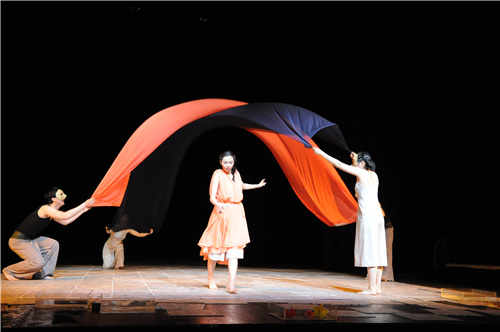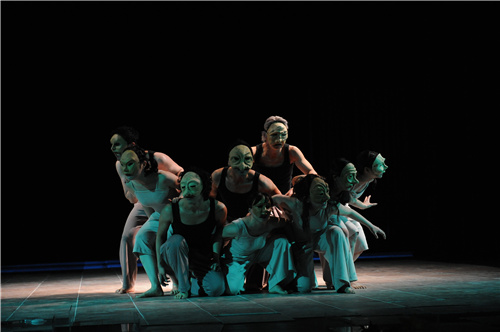
Director: Baek Shin Young
Playwright: Jean Racine
Institution: School of Theatre and Film, Chung-Ang University (CAU), Korea
Venue: North Theatre
Time: 16:30~18:10, May 20, 2010
Event: ATEC 5th International Forum with the 1st Asian Theatre Schools Festival

Director’s Notes
Everyone has a desire hidden inside their hearts, and we have been naturally pressing down our desires since the beginning of the Age of Reason. We resisted desires that are essential in human life such as money, honour, power, and affection, and we have been struggling to free ourselves from them. However, the struggle of pain paradoxically became the symbol of the reason we live on. We live for our desire. People cannot live a day without desire. It is hidden inside us in some form.
I see such desires of people in the work of Racine from 3 centuries ago although he focused on more or less the‘sense of guilt’of people tainted with desire. When he wrote this piece, it was when the Age of Reason arrived that reason was the absolute virtue and any desire succumbed to reason. However, I decided to see this work in a bit of a different angle. Everyone in the piece has desire including the heroine, Phedre, and their desires are not pressed down by their reason but expressed to others. For there are things that cannot be undone, like the spilt milk, we cannot take back the desire once it is expressed. I wanted to explore how expressed desires change our life and where they lead us to while giving taking into deep consideration how to interpret the beautiful lines and poetic sensibility of the original into today’s sense and words. Much work is needed before perfection, but I hope you enjoy the play considering the effort of the actors who were quite busy during the school term preparing the play while studying hard.

Synopsis
Queen of Athens, Phedre, falls in love at first sight with Prince Hippolyte, the son of her husband’s former wife. She was afraid that her affection might be revealed that she asks her husband and the King of Athens, Thesee, to banish him from Athens. Not long after that, Thesee goes on an expedition and asks his son Hippolyte in Tresen to take care of Phedre. Phedre meets Hippolyte in Tresen and suffers from the rapturous agony again. At the same time, Aricie from the enemy of the family comes to Tresen, and Hippolyte falls in love with her unlike himself who despised women all his life.
No news is heard from the king after 6 months since he left, and an unusual atmosphere starts to hang over the palace in Tresen. The death of the king, Thesee, is heard shortly after.

